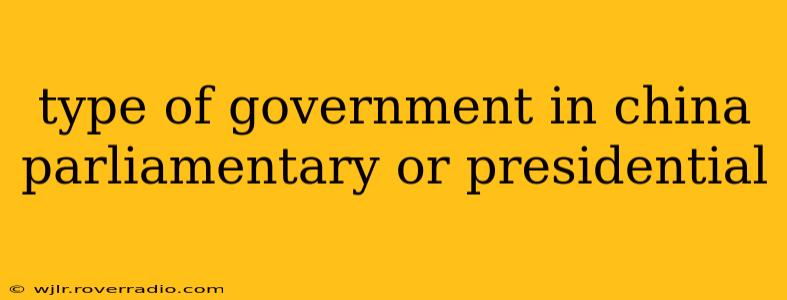The Type of Government in China: Neither Parliamentary nor Presidential
China's government is often mistakenly categorized as either parliamentary or presidential, but it's neither. It's a one-party state ruled by the Communist Party of China (CPC), operating under a system unique in its structure and functioning. While it has elements reminiscent of both parliamentary and presidential systems, key distinctions set it apart.
Let's explore this further and address some common questions:
Is China's Government a Parliamentary System?
No. While China has a National People's Congress (NPC), its role differs drastically from a parliament in a true parliamentary system. In parliamentary systems, the legislature (parliament) holds significant power, selecting the head of government (prime minister). The NPC in China, although theoretically the supreme organ of state power, is largely a rubber-stamp body that overwhelmingly approves policies and decisions predetermined by the CPC. The CPC, not the NPC, holds the real political power.
Is China's Government a Presidential System?
No. While the President of China holds a powerful position, the system isn't presidential in the traditional sense. In presidential systems, the president is both head of state and head of government, directly elected by the people (or through an electoral college). In China, the President's power is derived from their position within the CPC, not direct popular election. The President's role is largely ceremonial, overshadowed by the authority of the CPC and the Premier, who heads the State Council (the executive branch).
What Kind of System Does China Have?
China operates under a single-party socialist system. The CPC maintains absolute control over all aspects of governance, including the legislature, judiciary, and military. This dominance is formalized through the CPC's control over personnel appointments at all levels of government. The constitution acknowledges the NPC's supremacy, but in reality, the CPC dictates policy, ensuring the NPC's compliance. This creates a system where political power resides firmly within the CPC, with the state apparatus acting as its instrument.
How Does the CPC Maintain Power?
The CPC's power is maintained through various mechanisms:
- Centralized Control: The CPC has a hierarchical structure, with power concentrated at its top leadership. This centralized structure enables efficient policy implementation and minimizes dissent.
- Propaganda and Censorship: The CPC controls information flow, shaping public opinion through propaganda and strict censorship. This limits alternative viewpoints and solidifies the party's narrative.
- Patronage and Co-option: The CPC utilizes patronage networks and co-opts potential opponents to maintain its grip on power.
- Suppression of Dissent: The CPC actively suppresses any significant opposition, limiting freedom of speech and assembly.
What is the Role of the National People's Congress (NPC)?
The NPC, although constitutionally the highest organ of state power, largely serves as a legislative body that approves decisions already made by the CPC. Its members are indirectly elected, and its sessions are highly controlled. While it reviews and approves legislation, budgets, and appointments, these processes are largely predetermined by the CPC.
In conclusion, China's system of governance is unique and doesn't neatly fit into the conventional categories of parliamentary or presidential systems. Understanding its true nature requires recognizing the CPC's absolute control and the limited role of formally democratic institutions.
